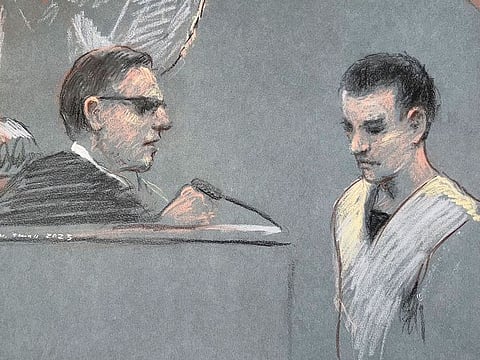US intel leak: Suspect discussed mass violence, had 'arsenal,' prosecutors say
Teixeira is accused of sharing classified information on the online chat platform Discord

New evidence filed in Massachusetts District Court suggests Jack Teixeira, the Massachusetts Air National Guard member suspected of leaking a trove of classified military intelligence, had a history of making violent comments, sought information about how to commit a shooting and had what prosecutors called a "virtual arsenal of weapons" stored at his places of residence, including an AK-style weapon.
In the court filing, prosecutors also accuse Teixeira of obstructing the investigation into the leaks by attempting to destroy evidence. The filing is intended to support the prosecutors' request that Teixeira remain in custody without a bond, which a judge is expected to decide on Thursday.
Teixeira's attorneys did not respond for request for comment late Wednesday.
Teixeira, 21, served with the 102nd Intelligence Wing at Otis Air National Guard Base and is accused of sharing classified information on the online chat platform Discord, in what is possibly the biggest military leak in a decade. Charged with the unauthorized retention and transmission of national defense information and the unauthorized removal and retention of classified documents, he could face 25 years in prison - possibly more.
The fallout has endured for weeks after the classified files exposed how the United States gathers intelligence on its allies and adversaries; documentation of battlefield conditions in Ukraine; movements of foreign leaders; and other revelations. The Air Force has suspended two commanders in the National Guard unit Teixeira worked in, a spokesperson for the military branch said in a statement Wednesday.
The former IT specialist, who is accused of sharing the documents on a Discord server named "Thug Shaker Central," has been described as a "charismatic gun enthusiast" who wanted to educate and inform his friends. But the new court filings reveal a fascination with mass killings and a concentrated effort to acquire military-grade weaponry while entertaining troubling ideas about how to use it.
In the court documents, prosecutors reveal that Teixeira was suspended from high school in 2018 after a classmate overheard him talking about "Molotov cocktails, guns at the school, and racial threats." On social media in recent years, he has continued such rhetoric, prosecutors say, writing in a November message that he wanted to kill a "ton of people" because it would be "culling the weak minded." In February, he asked a user for advice about what kind of rifle would fire best from an SUV, saying he wanted to commit a shooting in a "crowded urban or suburban environment."
Teixeira is also said to have used his military-issued device to search for "Las Vegas shooting," "Buffalo tops shooting," "Uvalde" and other shooting-related terms irrelevant to his job at the base.
A search of Teixeira's bedroom found that he kept a gun locker two feet from his bed containing handguns, bolt-action rifles, shotguns, an AK-style weapon and a gas mask, among other weapons, prosecutors say in the new filing. Investigators also found ammunition and tactical pouches on his dresser and what appeared to be a silencer accessory in his desk drawer, while photos of Teixeira's bedroom, submitted as evidence, show a hand-drawn design for a gun truck, a pile of rifle magazine pouches and other military paraphernalia.
The court filing also includes evidence that suggests Teixeira attempted to destroy electronic devices that could contain information about the leaks. A search of the dumpster outside his house found a smashed tablet, laptop and Xbox, as well as a box for a new iPhone. Two days before his arrest, Teixeira told colleagues he had a new phone number and email address.
"It appears that the Defendant took these steps with the intent to cover his tracks and to obscure his role in multiple crimes," prosecutors wrote.
In Wednesday's court filing, prosecutors expressed concern that Teixeira is a flight risk and a threat to public safety and national security.
In arguing that he should remain detained while awaiting trial, prosecutors noted that he "may still have access to a trove of classified information that would be of tremendous value to hostile nation states that could offer him safe harbor."
If released, he is likely to "continue to destroy evidence, influence witnesses, and otherwise seek to obstruct justice before trial," they wrote, adding, "The Defendant's troubling history raises serious concerns about what he would do if released into the community."
Sign up for the Daily Briefing
Get the latest news and updates straight to your inbox



